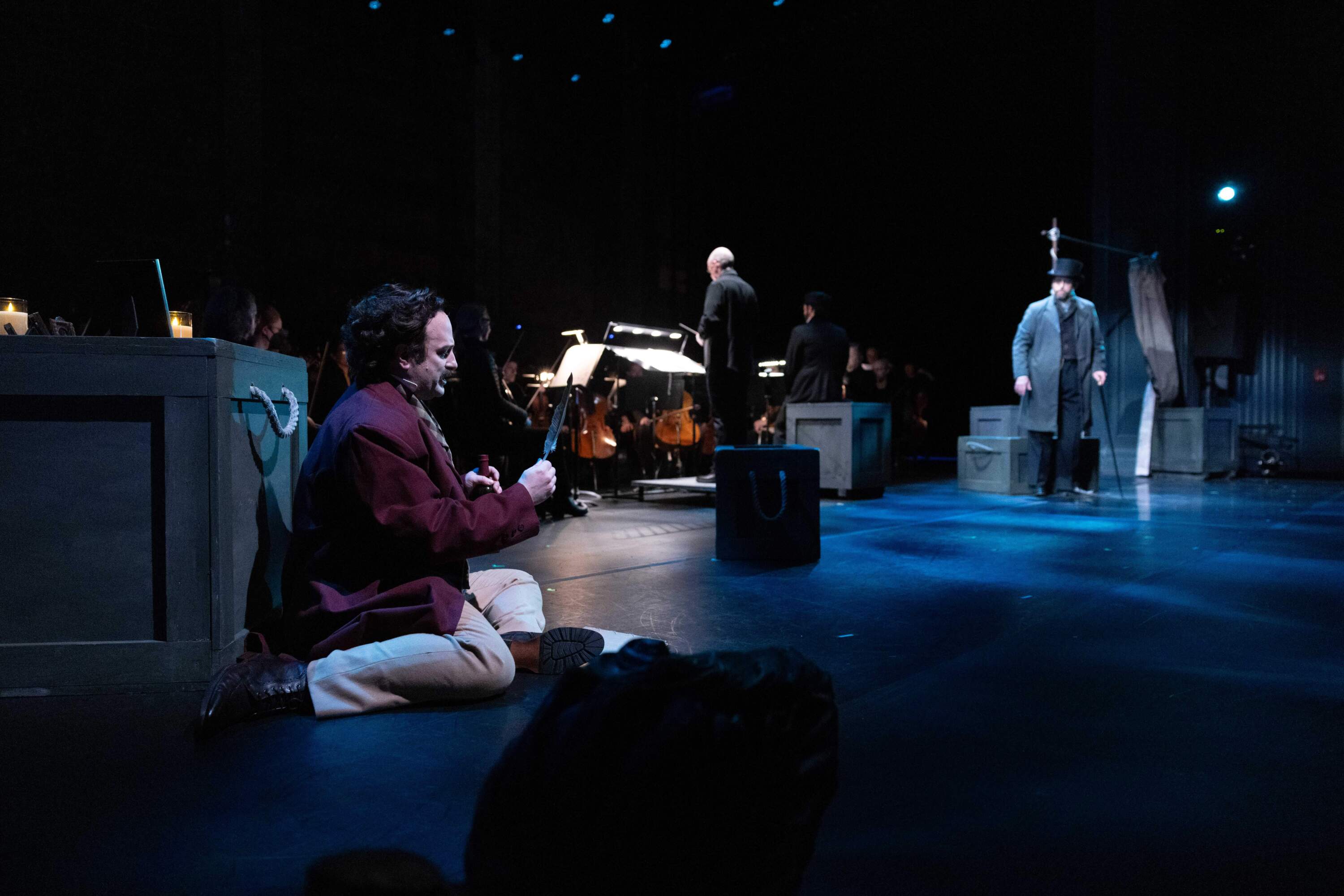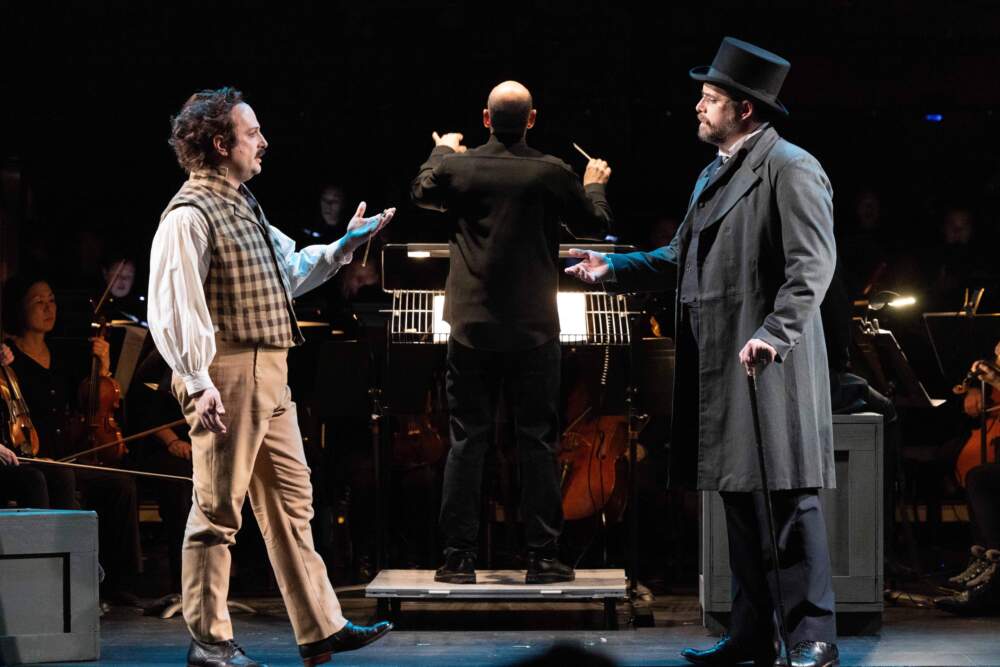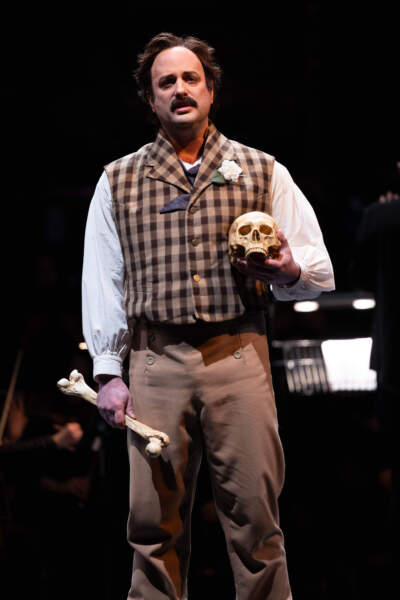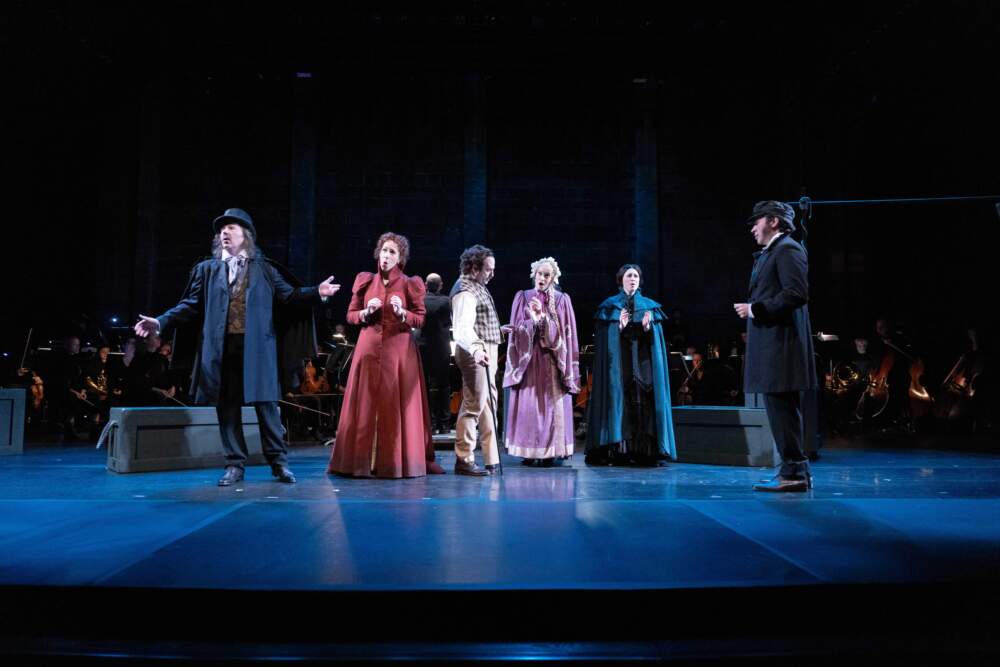Advertisement
Edgar Allan Poe's final woes revived in a forgotten opera
Resume
A lot of us know this iconic opening line: “Once upon a midnight dreary, while I pondered, weak and weary,” from Edgar Allan Poe’s creepy poem “The Raven.” What’s less known is the seminal horror writer was born in Boston in 1809, then died 40 years later — destitute and delirious — in Baltimore. Now, Poe’s final days are being conjured by the Boston Modern Orchestra Project in the forgotten, hallucinatory opera, "The Voyage of Edgar Allan Poe."
The poet has been parodied and caricatured countless times, which could make it hard to picture Poe belting it out in a contemporary opera. But for the orchestra's artistic director, Gil Rose, the brilliant but tormented artist makes a perfect protagonist.
“In the opera, he says he doesn't think or speak like other men, his life is sort of cursed by that fact,” Rose said. “What makes him special also curses him.”
In the opera, the distraught, beaten-down writer sings, “I am Edgar Poe, a poet, what can I do?” The complex, fever dream of a production exhumes his flaws, regrets and tragic trajectory.

In the 1970s, Rose said contemporary composer Dominick Argento and librettist Charles Nolte read about the master of the macabre’s mysterious demise in 1849. Argento noted it was “as bizarre as any story Poe himself had written.”
He boarded a boat in Richmond, Rose explained, “then was found in Baltimore in another man's clothes — kind of out of his mind.” The opera’s trippy, flashback vignettes imagine what pushed the 19th-century poet to that point. “Basically, it's a series of eight psychotic episodes in the mind of Edgar Poe before his death,” Rose said.
As in so many operas, the doomed hero has a duplicitous nemesis. Here, Poe’s frenemy is the reality-based gaslighter Rufus Griswold. “For some reason, that's not quite clear, Poe trusted Griswold enough to make him the agent of his literary estate,” Rose said, “and what a terrible character he was.“
In the opera, baritone Tom Meglioranza’s Griswold convinces Poe to board a haunted boat bound for Baltimore. Tenor Peter Tantsits portrays Poe, who’s broke, battling alcohol and riddled with guilt following his wife Virginia’s death. “His life was extremely sad,” Tantsits said, “and extremely painful.”
Misfortune hit Poe at a young age. He was born to Boston actors, then his father abandoned the family. His mother died. He was separated from his siblings. Then Poe went to live with his wealthy godfather, who eventually cut him off for gambling. The misery goes on.

But Poe found an outlet for his darkness in writing. His words and lines lace Nolte’s libretto, like literary Easter eggs. They’re sung by the cast and Odyssey Opera chorus members who represent real people, characters and ghosts from Poe’s past and present.
“The poems and some of his prose are disguised, almost as if you're inside Poe's head, as if the whole theater is his skull,” Tantsits said. “These are the thoughts whirling around in his consciousness.”
Overlapping vocals ebb and flow, often in choral cacophony. “Everyone's always hearing voices,” Rose said. “There are voices that appear in the rafters, they appear in the orchestra. And I think Poe also was hearing a lot of voices.”
Tantsits said he’s identified bits from 16 of Poe's published poems in the libretto, including “Annabelle Lee,” “Eldorado,” “To Helen,” “The Bells,” “The Raven” and “A Dream Within a Dream,” which was published six months before the writer died. "'Is all that we see or seem, but a dream within a dream.' It’s the full function of Poe right there," Tantsits said.
Rose elaborated on how Poe’s woes and words are woven through everything in subtle ways. “At one point, Poe says he can't write anymore, he has no inspiration,” Rose said, “and the chorus says, 'Nevermore.'”
The poems are also expressed through Argento’s musical ideas. Bells jingle, tinkle, moan and groan throughout the score. “They become almost a character,” Rose said. “It’s an incredibly visceral and exotic opera, at times it feels like a Hollywood soundtrack. And it has this luxurious sheen to it, but it's also composed in the scary, rigorous idea of 12-tone music that creates color and tension.”
Argento, a Pulitzer Prize-winning composer who died in 2019, blended modern techniques with neo-romantic tradition. Rose said at times this opera also evokes Americana. “There’s marching songs, drinking songs — you can hear everything from Charles Ives to Samuel Barber to George Rochberg — done with his own sense of style.”

Argento composed “The Voyage of Edgar Allan Poe” as a commission for the United States bicentennial in 1976. He chose Poe as a subject because he wanted to shed light on the first internationally famous American artist, Rose said. The opera’s last U.S. performance was in the 1990s, making it perfect fodder for the Boston Modern Orchestra Project and Odyssey Opera. Rose founded both groups with a mission: to resurrect and preserve neglected musical works.
“I just hate the idea that great pieces, for whatever reasons, get pushed aside,” he said, “and that opera companies in this country just play the same 12 operas over and over again.”
The semi-staged production of “The Voyage of Edgar Allan Poe” is up in Boston for one night only. But, Rose’s group is also producing the first professional recording of the opera. While researching the work, the conductor hunted for archival audio that documented its demanding sound. “Then we found a bootleg of a performance from Chicago,” Rose said, “and that gave us enough of a toehold.”
As for what Poe might think of this opera, Tantsits suspects the poet would be delighted. “Because what we're doing is sonorous, pleasing, hypnotic, intoxicating,” the tenor said, “These were all his favorite things, so I think he'd be pleased.”
Poe and his ghosts board their haunted ship at the Huntington Theatre on Friday, April 5, at 7:30 p.m.
This segment aired on April 5, 2024.
